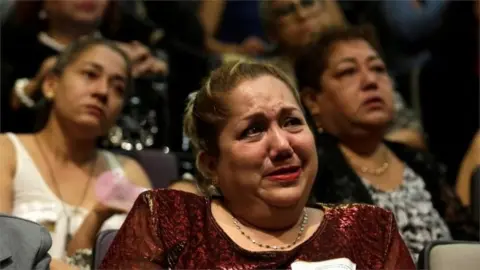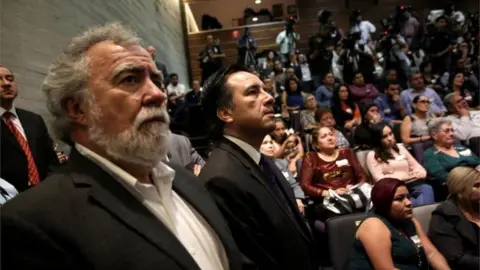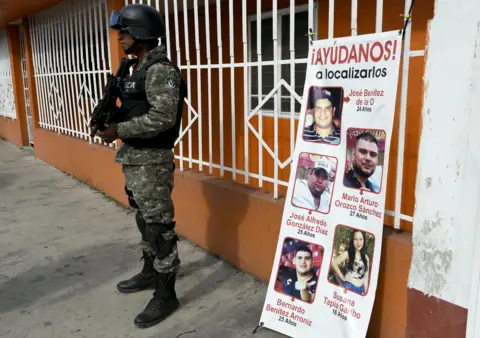Mexico apology after police handed youths over to gang
 Reuters
ReutersMexican officials have issued a rare apology to the families of five youths who were killed in 2016 in the eastern state of Veracruz.
Corrupt local police officers colluding with the notorious Jalisco New Generation drug cartel (CJNG) seized the five in the mistaken belief they were members of a rival gang.
They handed them over to the CJNG which killed them and burned their bodies.
More than 5,000 people have disappeared in Veracruz over the past decade.
'Profound responsibility'
When the state's new governor, Cuitláhuac García, was sworn in on 1 December, he launched an emergency plan to drive down the number of disappeared and requested help from international organisations to find those missing.
 Reuters
ReutersOn Monday, Governor García apologised to the relatives of the five murdered youths, four men aged between 24 and 27 and a 16-year-old girl, saying that "the collusion between police and organised crime wasn't stopped in time".
Mexico's deputy interior minister for human rights, Alejandro Encinas, said Mexico had a "profound responsibility" for what had happened.

You may also be interested in:

"We know that organised crime works with government officials at all levels," Mr Encinas said at an event attended by the youths' families at the Museum of Memory and Tolerance in Mexico City.
Mr Encinas said that while public apologies were not enough, they were "a first step" towards justice.
No criminal ties
However, the father of one of the five youths said: "I do not believe in the Mexican state's justice". He demanded that those responsible for his son's murder be sentenced.
 Getty Images
Getty ImagesTwenty-one people, among them eight Veracruz police officers, have been arrested in connection with the crime.
The youths, Bernardo Benítez, José Benítez, Susana Tapia, Mario Arturo Orozco and José Alfredo González, were stopped by the officers at a roadblock as they were returning to their home town after celebrating a birthday in the port of Veracruz on 11 January 2016.
Some of their remains were identified four days later in a mass grave some 60km (37 miles) from where the five friends had been seized.
The grave at Rancho El Limón contained remains of hundreds of bodies and is thought to have been a dumping ground used by drug cartels and corrupt police to dispose of bodies.
When the five friends first disappeared, local officials said they had links to organised crime, an accusation which has since been disproven.
The mother of Bernardo Benítez said the public apology had been the first official acknowledgement that the five had had no criminal ties.
"More than anything, we want to reclaim the good name of our kids (...) and demand justice for them and for thousands of others who experience the same thing," she said.
Their case resembles that of 43 students who disappeared from the town of Iguala in 2014 after being seized by local police in Guerrero who handed them over to a drug gang.
Mexican President Andrés Manuel López Obrador announced shortly after taking office in December that he would create a truth commission to investigate their disappearance.
